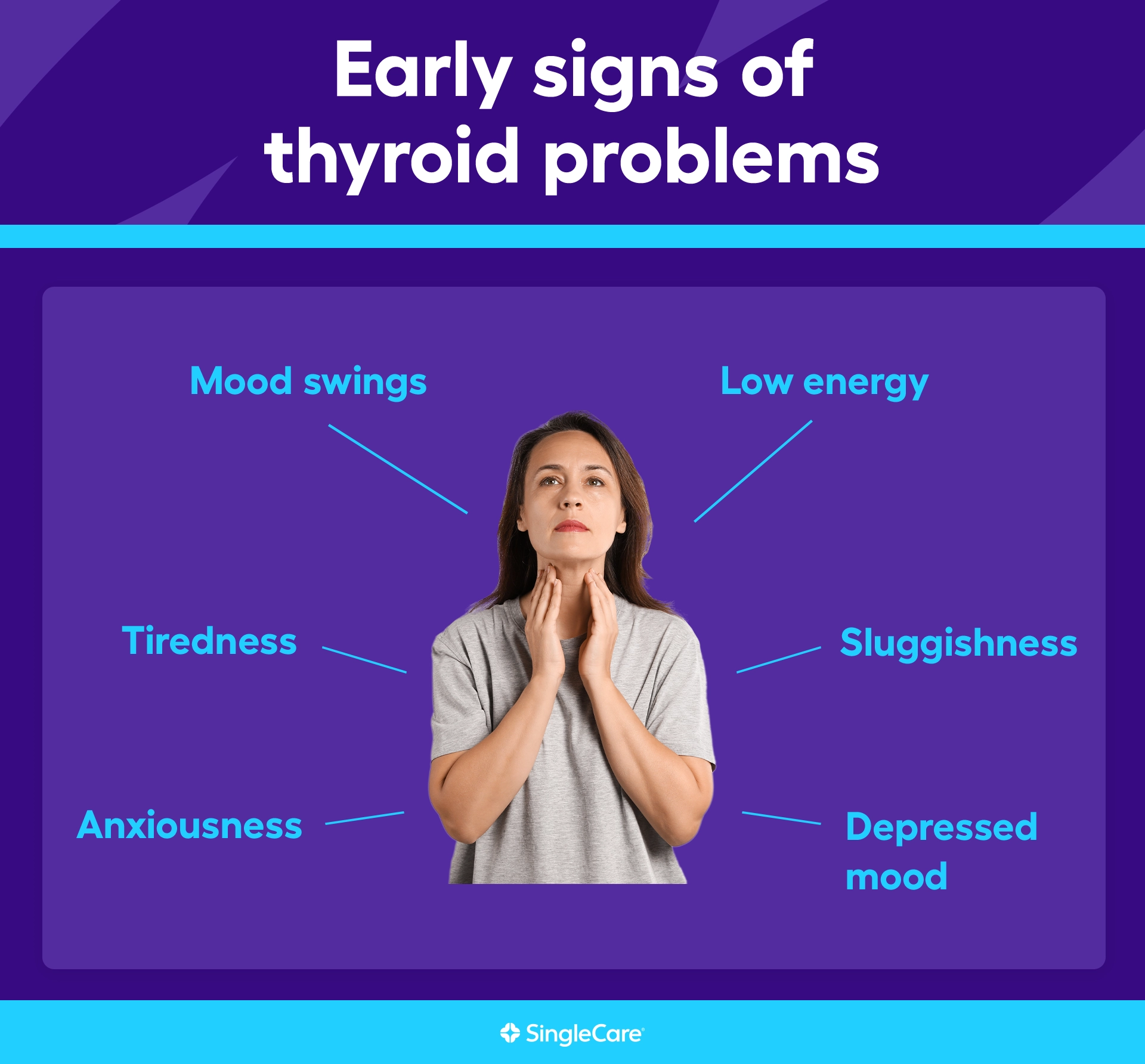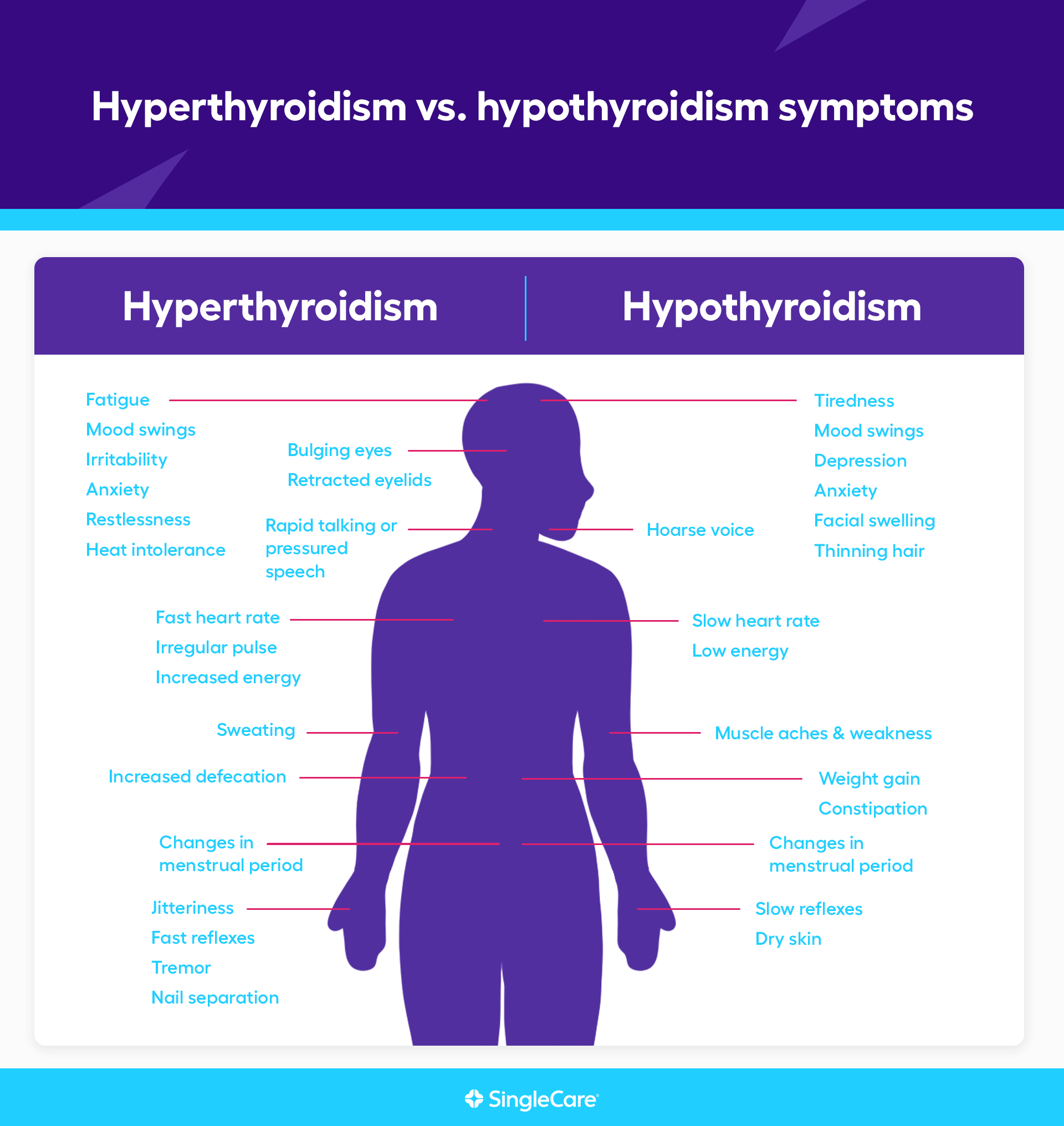- Home
- Symptoms Directory
- Symptoms of thyroid problems
Thyroid issues
Symptoms of thyroid problems: What are the early signs of thyroid issues?

Overview: What do thyroid issues feel like?
The thyroid is a small, butterfly-shaped gland in the neck. It’s not very big, but it affects every part of the body. Because thyroid hormones regulate how cells use energy, all the body’s functions can be thrown off when the thyroid gland has a problem. The body's tissues slow down if the thyroid gland produces too little thyroid hormone, called underactive thyroid. Too much thyroid hormone, called overactive thyroid, means the body’s tissues hit the accelerator, and everything speeds up.
The symptoms of thyroid issues will depend on whether the thyroid disorder increases or decreases thyroid hormone levels. When thyroid hormone levels go below normal, people feel tired, sluggish, constipated, and depressed. Additionally, energy levels may decrease, heart rate may slow down, and weight gain is possible. When thyroid hormone levels go above normal, people feel revved up, anxious, and restless. Energy levels increase. The heart beats faster. The body loses weight. The problem is that these symptoms can point to any number of medical conditions. It’s not always clear that the thyroid is involved. The only way to know is to get a blood test.
RELATED: Hypothyroidism vs. hyperthyroidism: compare causes, symptoms, treatments, & more
Key takeaways:
Thyroid issues are common health conditions that can affect anyone, regardless of age, sex, race, or ethnicity.
Early signs of thyroid issues include a lack of energy, depression, sluggishness, hyperactivity, restlessness, and nervousness.
Serious symptoms of thyroid issues, such as confusion, coma, slow breathing, hypothermia, racing heartbeats, severe agitation, psychosis, or high fever, may require immediate medical attention.
Thyroid issues are caused by genetics, autoimmune conditions, thyroid swelling, pregnancy, cancer, radiation treatment, surgery, and prescription drugs. You may be at risk for developing thyroid issues if you are a woman older than 60 years of age, pregnant, or have autoimmune disorders, a family history of thyroid issues, diabetes, pernicious anemia, or adrenal gland problems. Other risk factors include radiation treatment to the head or neck, radioactive iodine treatment, and thyroid surgery. People who eat large amounts of iodine, take iodine-containing drugs, or use nicotine products are also at risk.
Thyroid issues require a medical diagnosis.
Thyroid issues generally require treatment. Thyroid issues and symptoms typically resolve with treatment on a variable timeline, depending on the cause. Most people will experience symptom relief within the first few days of treatment.
Treatment of thyroid issues may include thyroid hormone replacements, prescription drugs, radiation treatment, or surgery. Read more about thyroid issues treatments here.
Untreated thyroid issues could result in complications, such as heart problems, trouble breathing, infertility, pregnancy problems, blood clots, stroke, goiter, eye problems, and osteoporosis.
Use coupons for levothyroxine, NP Thyroid, and atenolol to save up to 80%.
What are the early signs of thyroid problems?
The earliest signs of thyroid issues are typically changes in energy and mood. When there’s not enough thyroid hormone in the body, people will typically notice signs that include:
Mood swings
Low energy
Tiredness
Sluggishness
Depressed mood
Anxiousness
People with high thyroid hormone levels typically notice signs that include:
Increased energy
Mood swings
Restlessness
Irritability
Anxiousness
Problems falling asleep

Other symptoms of thyroid issues
Thyroid issues that cause low thyroid levels will have symptoms that include:
Weight gain
Constipation
Slow heart rate
Cold intolerance
Slowed reflexes
Facial swelling
Dry skin
Thinning hair
Muscle aches
Changes in menstrual periods: heavy periods, irregular periods, loss of periods
Thyroid conditions that cause high thyroid hormone levels will have symptoms that include:
Jitteriness
Rapid talking or pressured speech
Weight loss
Increased defecation
Fast heart rate
Irregular pulse
Heat intolerance
Fast reflexes
“Thyroid stare” (an “intense stare” appearance due to bulging of the eyeballs and retraction of the eyelids)
Sweating
Tremor
Fatigue
Nail separation
Changes in the menstrual cycle: irregular, infrequent, or light periods

Thyroid problems vs. PCOS symptoms
Polycystic ovary syndrome (PCOS) is a common hormone (endocrine) disorder among women. It’s very complex and is due to several things going wrong. Diagnosis can be tricky. Many of the symptoms of PCOS are due to elevated male hormone levels. Other symptoms are due to ovary dysfunction. What PCOS has in common with thyroid disorders are changes in the menstrual cycle. Mood changes, depression, and anxiety, though common in women with PCOS, are not considered symptoms of PCOS. However, they are significant complications of PCOS. So depression, anxiety, mood swings, and irritability are commonly experienced by women with either thyroid issues or PCOS.
| Thyroid issues | PCOS | |
| Shared symptoms |
|
|
| Unique symptoms |
|
|
RELATED: What is PCOS?
Types of thyroid issues: How can I tell which one I have?
Several thyroid diseases can affect thyroid function. Some are temporary, and others are long-term or even lifelong health problems. Thyroid diseases can either cause underactive thyroid or overactive thyroid. Some thyroid disorders, such as an enlarged thyroid, can cause both. The only way to tell what thyroid disorder is responsible for thyroid issues symptoms is to see a doctor.
Thyroid issues that can cause underactive thyroid include:
Hashimoto’s disease (an autoimmune condition that causes thyroid inflammation)
Iodine deficiency
Enlarged thyroid (thyroiditis)
Postpartum enlarged thyroid (postpartum thyroiditis)
Medical procedures (thyroid surgery, thyroid removal, radiation treatment, radioactive iodine treatment)
Prescription drugs
Being born with a low-functioning thyroid gland
Cancer of the pituitary gland or hypothalamus
Thyroid disorders that produce overactive thyroid symptoms include:
Grave’s disease (an autoimmune disease)
Goiter
Too much iodine in the diet
Thyroiditis
Postpartum thyroiditis
Prescription drugs
Benign thyroid cancer
Other types of cancer
RELATED: What causes thyroid symptoms? Related conditions and treatments
When to see a doctor for thyroid problems
See a doctor if there are two or more symptoms of hypothyroidism or hyperthyroidism. Most people will notice the symptoms, but will think that they’re due to other problems. Depression or anxiety may drive them to a therapist or psychiatrist. They might treat constipation or diarrhea with store-bought medications. These won’t help much if the thyroid is the cause. If multiple symptoms are experienced, start by talking to your primary care physician. You may get referred to an endocrinologist.
The endocrinologist will perform a physical exam and take a medical history. Thyroid function will be measured with a thyroid stimulating hormone (TSH) blood test and tests to measure levels of the two thyroid hormones: T3 (triiodothyronine) and T4 (thyroxine). The blood test may also be used to identify possible causes of thyroid problems.
Thyroid issues can be life-threatening. Severely low levels of thyroid hormones are a potentially fatal medical emergency called myxedema coma. The mortality rate is 25% to 60%. Go to an emergency room if a person is confused, nonresponsive, breathing slowly, and feels cold to the touch.
Severe hyperthyroidism is also a life-threatening medical emergency. Symptoms of a thyroid storm or thyrotoxic crisis include fast heartbeats, irregular heartbeats, agitation, psychosis, coma, and very high fever. Thyroid storms have a fatality rate of 8% to 25%, so get to an emergency room as quickly as possible.
RELATED: How to understand thyroid panel results
Complications of thyroid issues
Complications of untreated hypothyroidism include:
High cholesterol
Cardiovascular disease
Goiter
Pregnancy problems, including congenital disabilities
Swelling with a waxy sheen (myxedema)
Puffy face
Breathing problems
Myxedema coma (severely low thyroid hormone levels)
Complications of untreated hyperthyroidism include:
Heartbeat irregularities (arrhythmias)
Heart failure
Blood clots
Stroke
Osteoporosis
Thyroid eye disease (TED)
Infertility
Thyroid storm
How to treat thyroid problems
Thyroid issues usually require medical treatment. The exact treatment will depend on whether the thyroid is underactive or overactive. The underlying condition may need separate treatment. An underactive thyroid will require taking thyroid hormone replacement medication, usually levothyroxine pills. An overactive thyroid will require thyroid hormone production to be blocked, usually by thionamide drugs. Beta blockers are also used to blunt the effects of thyroid hormone. In the worst cases, some people may need to have the thyroid gland killed either through radioactive iodine treatment or surgical removal. They will then need to take thyroid hormone pills for the rest of their lives.
Not everyone will need medical treatment. If thyroid problems are caused by diet or prescription medications, then changing the diet or going off those medications will help resolve the problem.
RELATED: Thyroid hormones: uses, common brands, and safety info
Living with thyroid issues
For many people, thyroid issues are chronic or even lifelong problems. The good news is that treatment works, so the best advice is to see a healthcare professional, take all the medications as instructed, keep all follow-up appointments, and get thyroid hormone levels tested regularly. That will keep thyroid issue symptoms under control.
Most importantly, get tested
Thyroid symptoms are indeterminate. They can be signs of many different problems. As a result, people will often see a doctor or other healthcare provider believing they have some other problem. That healthcare professional may suggest having the thyroid checked. It is worth doing this. While the American Thyroid Association recommends that every adult be tested for thyroid function starting at age 35, there are no agreed-upon standards for when or how often thyroid testing should be done. Most guidelines agree that older adults, pregnant women, and people with one or more symptoms of thyroid issues should be tested.
RELATED: Thyroid health 101: common problems you should watch out for
FAQs about thyroid problems
What are the early signs and symptoms of thyroid cancer?
The earliest signs of an underactive thyroid are typically tiredness, fatigue, low energy, and depressed mood. The earliest signs of an overactive thyroid are nervousness, restlessness, high energy, and anxiety or worry.
Is anxiety a symptom of thyroid problems?
An overactive thyroid often produces anxiety, restlessness, and panic attacks.
Can high blood pressure be a sign of thyroid issues?
Both overactive and underactive thyroid can increase blood pressure. With too little thyroid hormone, arteries become less elastic, and blood pressure may increase. If there’s too much thyroid hormone, the heart beats faster. That, too, can raise blood pressure.
What’s next? Additional resources for people with symptoms of thyroid problems
Test and diagnostics
How to understand thyroid panel results, SingleCare
What is a TSH test and what do the results mean?, SingleCare
Treatments
Hyperthyroidism: diagnosis and treatment, American Family Physician
Hypothyroidism: diagnosis and treatment, American Family Physician
Hypothyroidism vs. hyperthyroidism: Compare causes, symptoms, treatments, and more, SingleCare
Hypothyroidism treatments and medications, SingleCare
Thyroid hormones: uses, common brands, and safety info, SingleCare
Scientific studies and clinical trials
Hypothyroidism, Nature Review Disease Primers
More information on related health conditions
What is PCOS?, SingleCare
Josephine Bawab, Pharm.D., graduated from Virginia Commonwealth University School of Pharmacy. She began working in community pharmacy in 2012 and has worked for multiple chain pharmacies since then. She is passionate about helping patients and precepting students. She currently works and resides in Virginia, where she is just a few minutes away from the beach.
...Related Drugs
Related Drug Information
Popular Prescriptions
Support
- Email Us Contact Us
- 24 Hours, 7 Days a Week
(Except Major Holidays)
- Customer Support 844-234-3057
- Provider Support 800-960-6918
Press Center
© 2024 SingleCare Administrators. All Rights Reserved.
* Prescription savings vary by prescription and by pharmacy, and may reach up to 80% off cash price.
Pharmacy names, logos, brands, and other trademarks are the property of their respective owners.
This article is not medical advice. It is intended for general informational purposes and is not meant to be a substitute for professional medical advice, diagnosis, or treatment. Always seek the advice of your physician or other qualified health provider with any questions you may have regarding a medical condition. If you think you may have a medical emergency, immediately call your physician or dial 911.
This is a prescription discount plan. This is NOT insurance nor a Medicare prescription drug plan. The range of prescription discounts provided under this discount plan will vary depending on the prescription and pharmacy where the prescription is purchased and can be up to 80% off the cash price. You are fully responsible for paying your prescriptions at the pharmacy at the time of service, but you will be entitled to receive a discount from the pharmacy in accordance with the specific pre-negotiated discounted rate schedule. Pharmacy names, logos, brands, and other trademarks are the property of their respective owners.Towers Administrators LLC (operating as 'SingleCare Administrators') is the authorized prescription discount plan organization with its administrative office located at 4510 Cox Road, Suite 111, Glen Allen, VA 23060. SingleCare Services LLC ('SingleCare') is the vendor of the prescription discount plan, including their website.website at www.singlecare.com. For additional information, including an up-to-date list of pharmacies, or assistance with any problems related to this prescription drug discount plan, please contact customer service toll free at 844-234-3057, 24 hours a day, 7 days a week (except major holidays). By using the SingleCare prescription discount card or app, you agree to the SingleCare Terms and Conditions found at https://www.singlecare.com/terms-and-conditions
© 2024 SingleCare Administrators. All Rights Reserved.